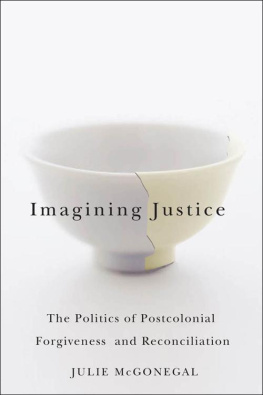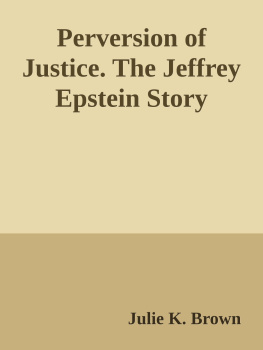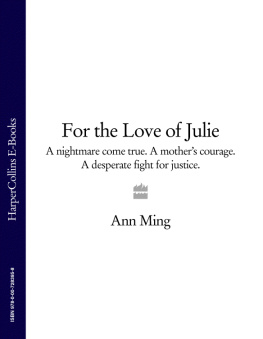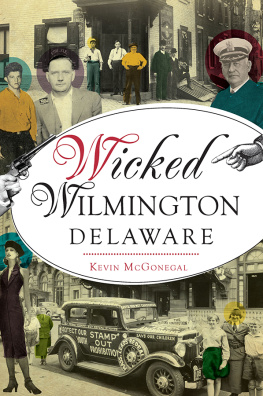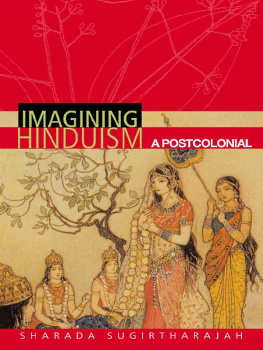Julie McGonegal - Imagining Justice
Here you can read online Julie McGonegal - Imagining Justice full text of the book (entire story) in english for free. Download pdf and epub, get meaning, cover and reviews about this ebook. year: 2009, publisher: McGill-Queens University Press, genre: Politics. Description of the work, (preface) as well as reviews are available. Best literature library LitArk.com created for fans of good reading and offers a wide selection of genres:
Romance novel
Science fiction
Adventure
Detective
Science
History
Home and family
Prose
Art
Politics
Computer
Non-fiction
Religion
Business
Children
Humor
Choose a favorite category and find really read worthwhile books. Enjoy immersion in the world of imagination, feel the emotions of the characters or learn something new for yourself, make an fascinating discovery.
- Book:Imagining Justice
- Author:
- Publisher:McGill-Queens University Press
- Genre:
- Year:2009
- Rating:5 / 5
- Favourites:Add to favourites
- Your mark:
- 100
- 1
- 2
- 3
- 4
- 5
Imagining Justice: summary, description and annotation
We offer to read an annotation, description, summary or preface (depends on what the author of the book "Imagining Justice" wrote himself). If you haven't found the necessary information about the book — write in the comments, we will try to find it.
Imagining Justice — read online for free the complete book (whole text) full work
Below is the text of the book, divided by pages. System saving the place of the last page read, allows you to conveniently read the book "Imagining Justice" online for free, without having to search again every time where you left off. Put a bookmark, and you can go to the page where you finished reading at any time.
Font size:
Interval:
Bookmark:
IMAGINING JUSTICE
The Politics of Postcolonial
Forgiveness and Reconciliation
JULIE MCGONEGAL

McGill-Queens University Press 2009
ISBN 978-0-77353458-2
Legal deposit first quarter 2009
Bibliothque nationale du Qubec
Printed in Canada on acid-free paper that is 100% ancient forest free
(100% post-consumer recycled), processed chlorine free.
This book has been published with the help of a grant from the Canadian Federation for the Humanities and Social Sciences, through the Aid to Scholarly Publications Programme, using funds provided by the Social Sciences and Humanities Research Council of Canada.
McGill-Queens University Press acknowledges the support of the Canada Council for the Arts for our publishing program. We also acknowledge the financial support of the Government of Canada through the Book Publishing Industry Development Program (BPIDP) for our publishing activities.
Portions of the material in chapter 4 (The Future of Racial Memory: Redressing the Past in Kogawas Obasan and Hsuka) were previously published in a slightly diffent form in Studies in Canadian Literature 30 (2005).

Library and Archives Canada Cataloguing in Publication
McGonegal, Julie, 1976
Imagining justice: the politics of postcolonial forgiveness
and reconciliation / Julie McGonegal.
Includes bibliographical references and index.
ISBN 978-0-7735-3458-2
1. Commonwealth literature (English) History and criticism. 2. Postcolonialism Commonwealth countries. 3. Postcolonialism in literature. 4. Forgiveness in literature. 5. Reconciliation in literature. 6. Malouf, David, 1934 Remembering Babylon. 7. Ondaatje, Michael, 1943 Anils ghost. 8. Kogawa, Joy. Obasan. 9. Kogawa, Joy. Itsuka. 10. Coetzee, J. M., 1940 Disgrace. 11. Literature and society Commonwealth countries History 20th century. 12. Literature and society Commonwealth countries History 21st century. I. Title.
PR9080.M29 2009 820.9353 C2008-904828-8

This book was typeset by Interscript in 10.5/13 Sabon.
This book began life as a doctoral thesis written during my tenure as a graduate student at McMaster University. My first thanks are to my colleagues in the Department of English and Cultural Studies at McMaster, whose intellectual example and warm friendship provided such a rich and pleasurable beginning to my journey as a scholar. Susie OBrien shepherded this manuscript through its various stages, blending critical acumen and rigour with empathy and generosity. Daniel Coleman has been one of my most enthusiastic supporters; his excitement about the ideas at the heart of this project have constantly inspired and sustained me. Donald Goellnicht has pushed me to engage the difficult questions, as well as challenged me to be vigilant in practising an ethics of responsibility. For all of this, I am deeply grateful.
Without the financial aid provided by SSHRC in the form of a doctoral fellowship, this project might not have been undertaken. I am also indebted to the Institute of Globalization and the Human Condition at McMaster for providing a research fellowship that enabled me to dedicate the time and intellectual energy to this project that it demanded. In addition to financial support, the institute provided a vibrant interdisciplinary community of young scholars, many of whom have contributed to this project through invigorating conversations and thoughtful responses. Finally, the travel scholarship provided by the Edna Elizabeth Ross Reevess family allowed me to undertake research on the Stolen Generations at the Australian National Library and Queensland University Library.
It is always a joy and relief to discover colleagues working through similar intellectual and ethical struggles as oneself. In the course of writing this book, I have benefited enormously from conversations and correspondence with others engaged in thinking about reconciliation. In particular, I would like to thank David Jefferess, Sabine Milz, Susan Spearey, and Gillian Whitlock for their productive and valuable suggestions. Moreover, without the astute and insightful readings of my two anonymous readers, the manuscript would not have acquired the coherence I hope it now has.
This project was undertaken during a time in my personal life that made me rediscover the importance of the community of love and support with which my family provides me. My parents, Bert and Sharon McGonegal, have supplied an abundance of guidance and encouragement. My sisters and brothers, Rose Mary, Elaine, Lisa, Mark, Kathleen, Cara, and Joshua, have been my closest and most cherished friends, gracefully allowing me to make all kinds of claims on them. My daughter, Breanna, who came into the world when this project was in its early stages, has blessed my life with the joy that newness brings into the world, and must be credited with teaching me, finally, of the value of a life committed to caring for another. Above all, I wish to thank Peter, for sustaining me with delicious food, good humour, and unabating love.
In Canada, the country of my birth and residence and the political landscape in which many of the ideas in this book were shaped, redress and reconciliation have emerged as they have in national politics virtually the world over as extraordinarily powerful discourses in the narrative of the nation. These discourses demand the attention of political and cultural theorists for the way that they symptomize and interrogate the problem of ethnic and racial hegemony in the twenty-first century, as well as for the way they confront us with the question of how to strategically construct a future that does justice to the victims of wholesale colonialism and widespread racism.
Are redress and reconciliation merely dogmas or illusions sustained by the inheritors of a nations power and privilege? Or might they represent something else, such as the possibility of a real alternative to what Edward Said calls the politics of blame and the even more destructive politics of confrontation and hostility?
Although this book promises no sure, ready answers to these crucial questions, it does offer a polemical perspective of its own, drawing particularly on the insights of postcolonial criticism and theory. I want to use the small space of this preface to set the stage for that perspective for the core arguments of this book as a whole by surveying, first of all, the politics of redress and reconciliation as they have unfolded recently in the Canadian context, and secondly, by intervening in a critical debate that has emerged in response to one of the best-known contemporary projects of national reconciliation, South Africas Truth and Reconciliation Commission.
Toward the end of 2005, as Canadians prepared for a federal election, the ruling Liberal Party unveiled several redress packages designed to address the historic grievances of many of the countrys ethnic groups. The first of these went to Ukrainian Canadians, who were interned as enemy aliens during World War I. In August 2005, after more than two decades of activist struggle, Ukrainian Canadians finally achieved an acknowledgment from the Canadian government of the injustice of their internment and were offered $2.5 million in funding for commemorative plaques and educational tools. A few months thereafter, in November, the Canadian government recognized the wrongs inflicted on Italian Canadians who were, like Japanese Canadians, interned during World War II. This redress package also included an acknowledgment of injustice and funding for commemorative exhibits but excluded an apology or financial compensation for survivors.
Next pageFont size:
Interval:
Bookmark:
Similar books «Imagining Justice»
Look at similar books to Imagining Justice. We have selected literature similar in name and meaning in the hope of providing readers with more options to find new, interesting, not yet read works.
Discussion, reviews of the book Imagining Justice and just readers' own opinions. Leave your comments, write what you think about the work, its meaning or the main characters. Specify what exactly you liked and what you didn't like, and why you think so.

